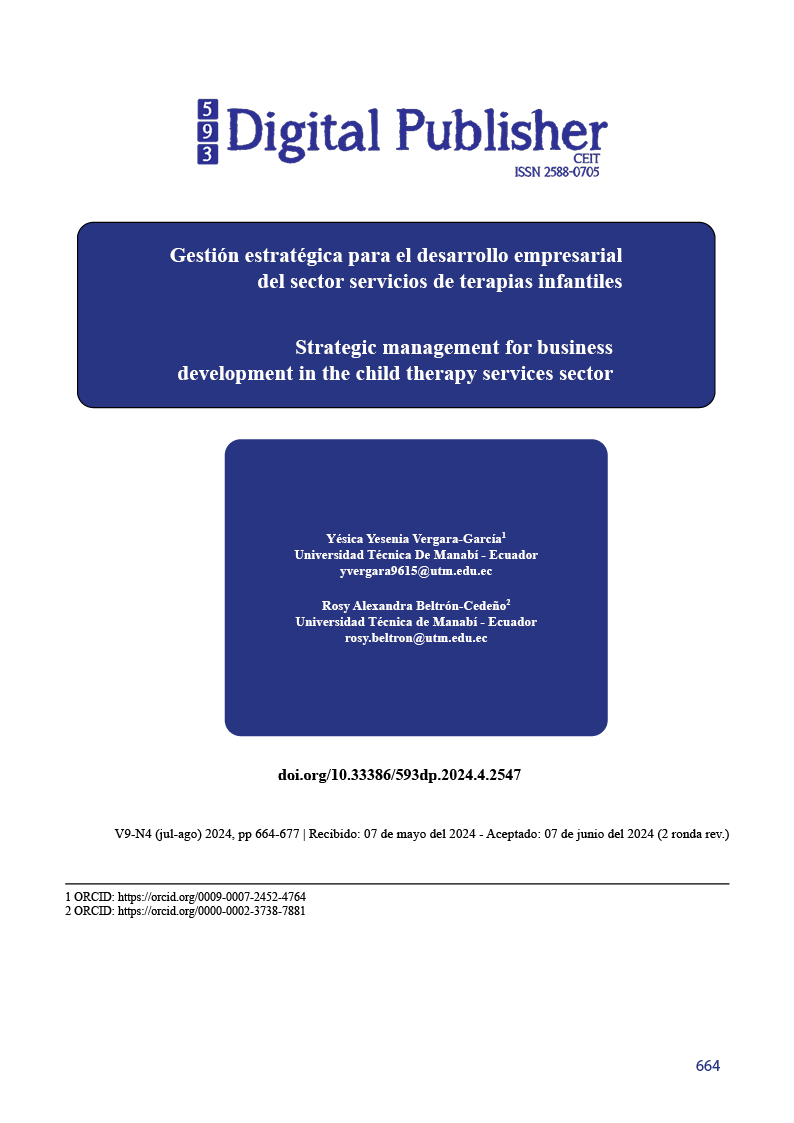Strategic management for business development in the child therapy services sector
Main Article Content
Abstract
Strategic management is a very effective tool that offers a broad vision to managers to understand the market, the company's position within it and how to adjust the strategic plan to achieve the objectives in the year of operations. Analyzing strategic management mechanisms and their contribution to the development of child therapy service companies operating in the city of Manta, Ecuador, was the objective of the research; through a quantitative approach, documentary analysis method, expert interview techniques and structured survey with 34 questions related to strategic management and business development, categorized into 6 dimensions, scored on a Likert scale, and validated by Cronbach's index, was applied to a sample of 3 managers of this type of companies. The results reflect a very high strategic management in the 3 dimensions analyzed for the children's therapy services sector, as well as a continuous business development of this sector, which is correlated with the strategic management executed by these companies to provide a service to the satisfaction of the users. Concluding in the contribution of strategic management to business development involving as a number one factor in the delivery of the service to the staff, based on an inclusive child therapy service.
Downloads
Article Details

This work is licensed under a Creative Commons Attribution-NonCommercial-ShareAlike 4.0 International License.
1. Derechos de autor
Las obras que se publican en 593 Digital Publisher CEIT están sujetas a los siguientes términos:
1.1. 593 Digital Publisher CEIT, conserva los derechos patrimoniales (copyright) de las obras publicadas, favorece y permite la reutilización de las mismas bajo la licencia Licencia Creative Commons 4.0 de Reconocimiento-NoComercial-CompartirIgual 4.0, por lo cual se pueden copiar, usar, difundir, transmitir y exponer públicamente, siempre que:
1.1.a. Se cite la autoría y fuente original de su publicación (revista, editorial, URL).
1.1.b. No se usen para fines comerciales u onerosos.
1.1.c. Se mencione la existencia y especificaciones de esta licencia de uso.
References
Baldeón, J., Betalleluz, F., Calixto, E., Gamarra, E., Guerra, M., & Silvestre, O. (2023). El método empírico – analítico en el ámbito educativo. Educanatura, 4(4), 53-60. doi:https://doi.org/10.26490/uncp.educanatura.2022.4.1.1769
Bordas, M. (2017). Gestión estratégica del clima laboral. Universidad Nacional de Educación a distancia. https://books.google.com.ec/books?hl=es&lr=&id=7ICxCwAAQBAJ&oi=fnd&pg=PP1&dq=gestion+estrategica+empresarial&ots=o_IDu_Gzg2&sig=IO7pohcu57-EnycWR8JQ1rsBzaU#v=onepage&q&f=false
Castro, B. (2017). Planeamiento Estratégico del Marketing Digital en Colombia. (Tesis de maestría). Universidad Católica del Perú. https://tesis.pucp.edu.pe/repositorio/bitstream/handle/20.500.12404/8792/CASTRO_ESTEBAN_PLANEAMIENTO_DIGITAL_COLOMBIA.pdf?sequence=3&isAllowed=y
Delfin, F., y Acosta, M. (2018). Importancia y análisis del desarrollo empresarial. Pensamiento & gestión, 40(1), 184-202. doi:http://dx.doi.org/10.14482/pege.40.8810
Fajardo, L. (2018). Gestión estratégica y desarrollo empresarial de las operadoras de transporte terrestre intraprovincial de pasajeros del cantón Milagro, Ecuador. Universidad Nacional Mayor de San Marcos. https://cybertesis.unmsm.edu.pe/bitstream/handle/20.500.12672/7642/Fajardo_vl.pdf?sequence=3&isAllowed=y
Falcón, W., Pertile, V., y Ponce, B. (9-11 de octubre de 2019). La encuesa como instrumento de recolección de datos sociales. Construyendo una Geografía Crítica y Transformadora: En defensa de la Ciencia y la (págs. 1-24). Ensenada: Universidad Nacional de La Plata. Facultad de Humanidades y CIencias de la Educación. https://www.memoria.fahce.unlp.edu.ar/trab_eventos/ev.13544/ev.13544.pdf
Feria, H., Matilla, M., y Mantecón, S. (2020). La entrevista y la encuesta ?Métodos o Técnicas de investigación empírica? Revista Didasc@lia: Didáctica y Educación, 11(3), 61-78. https://revistas.ult.edu.cu/index.php/didascalia/article/view/992
Giler, R., Zambrano, V., y Macías, T. (2019). Rincones lúdicos sensoriales sobre estimulación de ninos y ninas. International Journal of life sciences, 3(2), 217-223. doi:https://doi.org/10.29332/ijssh.v3n2.317
Huiza, Y. (2019). El marketing digital y la gestión estratégica empresarial. Tesis de maestría. Universidad Peruana de Ciencias e Informática. https://repositorio.upci.edu.pe/bitstream/handle/upci/27/HUIZA_YONY.pdf?sequence=1&isAllowed=y
Lopera, J., Ramírez, C., Zuluaga, M., y Ortiz, J. (2010). El método analítico como método natural. Nómadas. Critical Journal of Social and Juridical Sciences, 25(1), 1-27. https://www.redalyc.org/articulo.oa?id=18112179017
López, A. (2018). Gestión estratégica y medición. AECA. https://aeca.es/old/pub/monog/TMPce81kztbrs.htm
Luciani, T., Zambrano, M., & González, O. (2019). MIPYMES ecuatorianas: Una visión de su emprendimiento, productividad y competitividad en aras de mejora continua. Cooperativismo y Desarrollo, 7(3), 313-332. http://scielo.sld.cu/scielo.php?script=sci_arttext&pid=S2310-340X2019000300313
Macías, T. (15 de febrero de 2024). Importancia de la gestión estratégica en el desarrollo de empresas de terapias infantiles. (Y. Vergara, Entrevistador)
Mendoza, J., Macías, G., y Parrales, M. (2021). Desarrollo empresarial de las mipymes ecuatorianas: su evolución 2015-2020. Revista Publicando, 8(31), 320-337. https://doi.org/10.51528/rp.vol8.id2253
Navas, O., Fajardo, L., Vásquez, C., y Vásquez, X. (2018). Estrategias de negocios aplicadas a las PYMES y su incidencia en el desarrollo empresarial del sector económico industrial en la zona tres de Ecuador. RECIAMUC, 2(2), 572-594. https://doi.org/10.26820/reciamuc/2.2.2018.572-594
Prieto, A. (2017). Introducción a la gestión estratégica. Univeristat de Barcelona. https://laplazahumana.com/mod%202/mod%202%20tema%201.pdf
Salazar, E., y Rodríguez, V. (2023). Proceso administrativo y desarrolloempresarial: caso mipymes de abarrotes,ciudad de jipijapa. UNESUM-Ciencias. Revista Científica Multi-disciplinaria, 7(1), 70-84. https://doi.org/10.47230/unesum-ciencias.v7.n1.2023.709
Samari, M., y Gallella, M. (2021). “El desafío de la Inclusión educativa. Análisis de los factores que obstaculizan y/o facilitan la educación inclusiva. Una mirada desde los docentes y la familia [Tesid de licenciatura en psicopedagogía]. Pontificia Universidad Católica Argentina. https://repositorio.uca.edu.ar/bitstream/123456789/12460/1/desafio-inclusion-educativa.pdf
Sánchez, I., Benítez, F., Moscoso, A., Moscoso, A., y Munoz, M. (2020). Desarrollo sostenible en las MIPYMES de Ecuador y su impacto en el consumidor. CUMBRES, 61), 33-42. https://doi.org/10.48190/cumbres.v6n1a3
Taber, K. (2018). The Use of Cronbach’s Alpha When Developing and Reporting Research Instruments in Science Education. Res Sci Educ, 48, 1273–1296. https://doi.org/10.1007/s11165-016-9602-2
Torres, J., y Luna, I. (2017). Evaluación de la percepción de la calidad de los servicios bancarios mediante el modelo SERVPERF. Contaduría y Administración, 62, 1270–1293. http://dx.doi.org/10.1016/j.cya.2016.01.009



